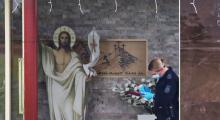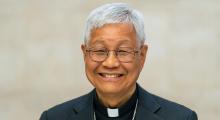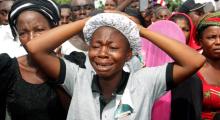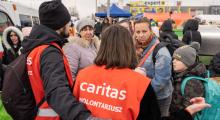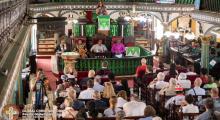Issued by the Catholic Center for Studies and Media - Jordan. Editor-in-chief Fr. Rif'at Bader - موقع أبونا abouna.org
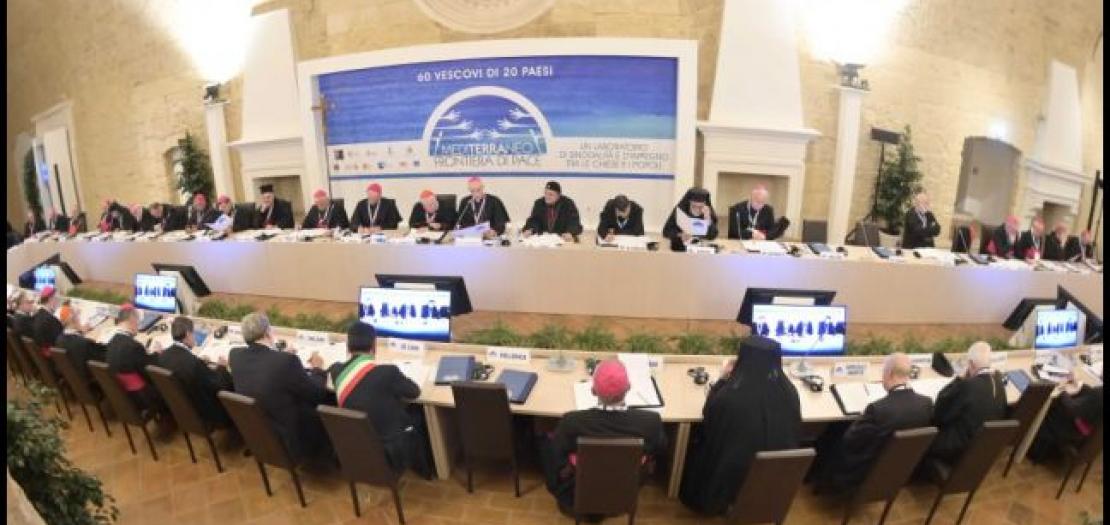
On the first day of their Bari ‘synod’, February 19, 60 bishops from 20 countries around the Mediterranean deplored the “economic and interested wall” dividing the countries around that sea.
CARDINAL BASSETTI: “THE ALTERNATIVE TO PEACE IS THE RISK OF CUNCONTROLLED CHAOS"
“In the era of drones and nuclear bombs, in the era in which for the first time we are forced to deal with the fact that the Earth’s resources are not infinite and in which science and technology have connected the world by putting man in a position to destroy or save the planet, there is no alternative to peaceful conflict resolution and collaboration”, Italian Bishops’ President and host of the synod, Cardinal Gualtiero Bassetti of Perugia, insisted in his opening address to his brother bishops February 19.
“Especially in the Mediterranean basin, where tensions and conflicts from around the world converge, the alternative to peace is the risk of uncontrolled chaos”, Bassetti warned.
“Nor should we forget, dear brothers that the wall that divides the people is above all an economic and interested wall,” Bassetti continued in his keynote speech.
The cardinal deplored the presence of “an invisible border in the Mediterranean that separates people of misery from people of well-being”.
“The promise of the development of the peoples that have emerged from the unfair colonial systems of the last century has been betrayed, while the capacities of the richest states to carry out inclusive social policies are cut down”, Bassetti thundered.
Observing that “there is an inseparable link between poverty and instability”, the Italian cardinal warned “there can be no peace without improving life in the deprived areas of the Mediterranean and in sub-Saharan Africa”.
“There can be no sustainable development without changing the rules that underlie an economy of inequality that kills”, Bassetti insisted.
In the same way, there will be no peace nor development for the Mediterranean either without answers to the migrations crises, warned the cardinal: that is, “without people having the right to remain in their homeland to build a better future for themselves and their families, and without giving back the right to all men and women, citizens of the world, also to migrate”.
For those reasons, Bassetti called on his brother bishops of the region to push the international community – “barely” handling at the moment the “humanitarian crises” in the Mediterranean – to ensure “that international disputes be addressed and resolved within the framework of the law, the common good and stronger, more pragmatic and more incisive action on the part of the United Nations”.
CARDINAL HOLLERICH: “THE CHURCH MUST BE EUROPE'S CONSCIENCE"
For his part, the Archbishop of Luxembourg and President of the Commission of the Episcopates of the European Union (COMECE), Cardinal Jean-Claude Hollerich, told SIR February 19, also from Bari, that the situation in the Lesbos migrant camps “is much more dramatic” today than he visited a year ago.
“This has to stop. The Church must raise her voice, she must be a prophetic voice. The Church must be Europe’s conscience”, Hollerich implored.
“How can we talk about European values when no aid is available to the refugees dying in the Mediterranean and to countries in the front line such as Italy, Greece, Malta, Spain?”, the cardinal asked.
ARCHBISHOP OF TUNIS: “FIRST WE MUST ASK OURSELVES WHAT WE CAN DOFOR MIRGRANT COUNTRIES"
In the same vein as Hollerich, Ilario Antoniazzi, the Italian-born Archbishop of Tunis, also told SIR February 19 that migrants that succeed in reaching European shores “should obviously be welcomed with dignity and respect”.
“First we must ask ourselves what we can do for their countries”, the Tunis archbishop insisted.
Many migrants “decide to cross the desert and the Mediterranean Sea because, they say, ‘we have nothing to lose. If we ever reach Europe we will have achieved something’. We witnessed their desperation”, added for his part, also to SIR February 18, the Apostolic Vicar of Tripoli, George Bugeja.
Asked about the prospects for true peace and reconciliation in Libya, Bugeja said “I have faith. I believe that sooner or later it will happen.”
“I believe there is a willingness to reach that stage. We hope it will happen soon. To some extent, the stabilization of the country will also contribute to the solution of the migration problem from its shores.”
Meanwhile, the bishops’ work at the Bari synod on Thursday, February 20 were devoted to the theme “Delivering the Faith to Future Generations”'.
The Friday's sessions, February 21, sessions will be on the subject of “Relationship between Church and Society: Mobility, Citizenship, Religious Freedom, and Inequality”.
Both days included morning roundtable discussions followed by assembly discussions and afternoon conclusions, the Holy See news agency said.
ON SATURDAY, an assembly will be held for general conclusions that will be condensed into the final document, followed by the public event in Bari’s Petruzzelli Theater titled, “In the Same Boat”.
ON SUNDAY, Pope Francis will travel to Bari to address the meeting, to celebrate a closing open-air Holy Mass and to receive the final document of the bishops.



